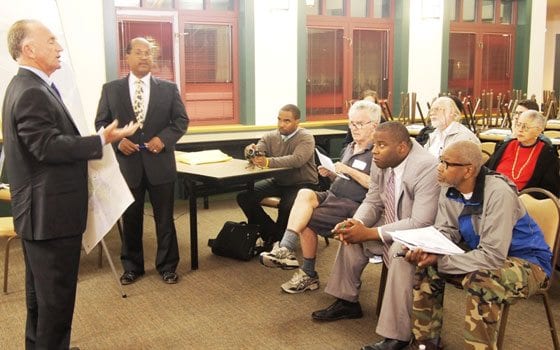
The City Council’s Redistricting Committee is in the midst of re-drawing the nine council districts, a process councilors expect to complete by the end of the year.
But so far, the three hearings held by the Redistricting Committee have been sparsely attended and largely overshadowed by the state Legislature’s redistricting process.
Committee Chairman Bill Linehan and District 6 Councilor Matt O’Malley both pointed out that the 34 people who turned out to last week’s hearing at the William E. Divine Clubhouse at Franklin Park constituted the largest crowd for any of the hearings held thus far.
That observation didn’t sit well with Rasaan Hall, deputy director of the Lawyer’s Committee for Civil Rights.
“If this is the third hearing and this is a packed house, this is a crying shame,” he said. “There are plenty of groups that want to have an impact on how the districts are re-drawn.”
The hearing, also attended by councilors Charles Yancey, Tito Jackson and Matt O’Malley, was the third of four scheduled. The last hearing was scheduled to be held at the Reggie Lewis Athletic facility on Oct. 18.
What’s at stake for voters in the black community and throughout the city is a process that can determine how their neighborhoods are represented in the City Council. Although more than half of the city’s residents are people of color, only two of the nine district council seats are held by people of color — District 7 held by Tito Jackson and 4, held by Charles Yancey.
Although two additional districts are majority-minority — District 5 held by Rob Consalvo and District 3, which is now open — neither has ever elected a person of color.
Historically in Boston, districts have been drawn to protect the incumbency of the overwhelmingly white council. The majority of the city’s non-white population is packed into districts 4 and 7 at the center of the city. The population of District 4 is 96 percent people of color — District 7 is 76 percent. The other seven districts are drawn around the periphery of 4 and 7, embracing the historically white strongholds of South Boston, Savin Hill, Neponset and Cedar Grove in Dorchester, West Roxbury, Allston/Brighton, Back Bay, Beacon Hill and Charlestown.
When the districts were drawn, rather than lumping the predominantly white sections of Dorchester in with the adjacent community of South Boston, the South Boston council district was drawn to include Chinatown and the South End, two communities with smaller voting populations, more people of color and histories of supporting more progressive candidates.
Similarly, the District 6 seat, which has always been held by a West Roxbury resident, also includes most of Jamaica Plain and part of Roslindale, neighborhoods with more people of color and more progressive voting patterns.
Redistricting Committee Chairman Bill Linehan pointed out that he may have the most to lose in this year’s re-drawing. The population in the northern portion of the city has increased relative to the south of the city. District 2, which includes Linehan’s home in South Boston, has had the most growth of any district with a population of 74,069. Abutting his district to the south is Dorchester’s District 3, which has just 60,853 people, the lowest population of any district.
“They need a greater population to meet the minimum number,” Linehan said. “They need to encroach on the north.”
Jackson is in a similar predicament. Each district should have 68,621 people, to ensure that every councilor represents the same number of people. But District 7 now has 73,002 people and will need to lose 4,500. Jackson, who lives in the southernmost precinct in the district, could easily have his home drawn off the map.
Linehan said the council would take incumbency into account in redrawing the districts, although it is not a requirement.
Linehan said the committee will draw up a proposed map by the end of November. A period for public comment will last between 12 and 20 days. He said the council would probably hold another hearing after their map is released.
“We will give folks ample time to give any response,” he said.
Councilors will then make any changes before submitting a final map, which the mayor must sign off on.
Most of the input audience members at the Devine Clubhouse gave revolved around not splitting Ward 12 between councilors and having the committee do better outreach to voters and community-based organizations.
Victoria Williams, Co-Chairwoman of the Ward 12 Democratic Committee, said having a public comment period during the holidays would probably not work well.
“I wouldn’t want this to happen when I’m doing my Christmas cards,” she commented.
Hall pointed out that many of the community groups most concerned about political representation are currently advocating greater minority representation in the state’s redistricting process.
“It’s nearly impossible to do both,” he said.
Mass VOTE co-director Cheryl Crawford asked that the committee hold a hearing after the Nov. 8 election.
“A lot of people who are civically engaged are working on campaigns,” she said.
Linehan said he would consider extending the hearings.
“We’re hearing that there should be more outreach and we take that seriously,” he said.


![Banner [Virtual] Art Gallery](https://baystatebanner.com/wp-content/uploads/2024/04/Cagen-Luse_Men-at-store-e1713991226112-150x150.jpg)



